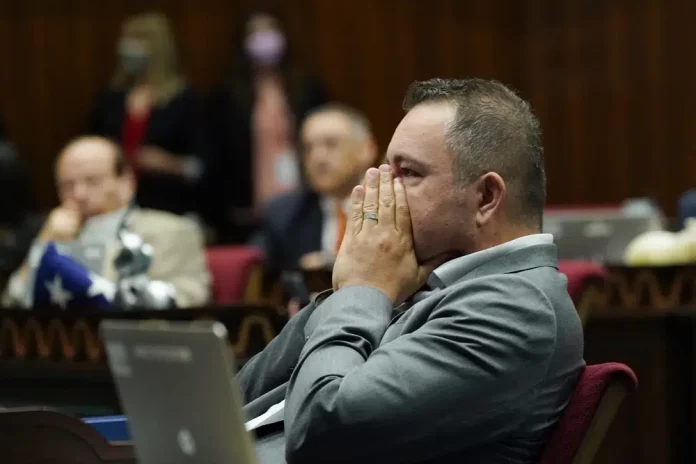
Arizona’s Republican-controlled Legislature has for years entertained a host of unsupported theories about fraudsters manipulating election results since Donald Trump’s loss in 2020.
But lawmakers reached a limit for what they will tolerate last week when a daylong hearing about elections ended with a presentation accusing a wide range of politicians, judges, and public officials of taking bribes from a Mexican drug cartel.
Republican leaders raced Monday to distance themselves from the claims after they caught fire over the weekend on social media, where accounts that routinely share unsubstantiated claims of election fraud covered them widely. It was an embarrassment for an election fraud movement that has mostly found a sympathetic or at least tolerant, ear among Arizona legislative Republicans.
House Speaker Ben Toma and Senate President Warren Petersen, both Republicans, pinned blame for the presentation on Rep. Liz Harris, a newly elected Republican who led a door-to-door canvassing effort searching for proof of fraud following the 2020 election. Her effort drew scrutiny from the U.S. Department of Justice’s civil rights division, who warned about potential voter intimidation.
“What should have been a joint hearing to examine commonsense election reforms devolved into disgraceful fringe theater,” Toma said in a statement Monday. “I’m not alone in believing that it was irresponsible and bad judgment for Ms. Harris to invite a person to present unsubstantiated and defamatory allegations in a legislative forum.”
Harris did not respond to a request for comment.
Arizona Republican lawmakers have given wide leeway for people claiming to be election experts to share unsubstantiated or disproven claims in hearings at the Capitol. They’re widely shared among right-wing media figures and carry the imprimatur of an official legislative proceeding.
Last week’s hearing was just the latest in a series of similar events since the start of the year, though it was the first to catch such widespread backlash.
The focus on election conspiracies has persisted despite the drubbing that Republicans took in last year’s election. The GOP was shut out of the state’s top offices after voters rejected Republicans who promoted election lies.
Still, the ranks of election deniers in the Legislature grew as moderate Republicans declined to run for re-election or lost GOP primaries.
Petersen, the Senate president, said he agreed to allow last week’s controversial hearing at the request of Harris and Toma, adding that Majority Leader Sonny Borrelli asked to review materials before they were presented but was not shown the bribery allegations.
“I assure you, had he known about the report, he would not have allowed it to be included,” Petersen said in a statement. “This was definitely not the proper venue to make such allegations, nor to assess the credibility of such statements.”
Even Sen. Wendy Rogers, who is deeply enmeshed in the national “stop the steal” movement of Trump supporters who claim the election was rigged and refused to back down when she was censured by the Senate last year, backtracked this time.
“To our knowledge, none of the people named had charges filed, have prosecutions pending, nor had any convictions made against them,” Rogers said in a statement Sunday night. Rogers is chair of the Senate Elections Committee.
The allegations came at the end of a daylong hearing of the elections committees in the state House and Senate, which Democrats boycotted. They were offered in a 40-minute presentation by Jacqueline Breger, an insurance agent from Scottsdale, who attributed them to a report written by John Thaler, who she said was an attorney with a background in fraud investigations.
Thaler alleged, without reliable evidence, that two women working on behalf of the Sinaloa cartel used fraudulent mortgage documents to launder money to a wide range of officials, both Republicans and Democrats. Online sleuths discovered the women Thaler accused of facilitating the fraud were his ex-wife and her mother.
Thaler has a history of filing lawsuits accusing them of carrying out wide-ranging conspiracies. A federal judge last year dismissed one of his lawsuits, calling it “a delusional and fantastical narrative.”
Thaler responded to a request for comment with an email questioning Toma’s ethics.
“Speaker Toma is in no position to make any comment concerning (sic) findings related to election integrity or in what forum they should be presented,” Thaler wrote.
Republished with the permission of The Associated Press.













